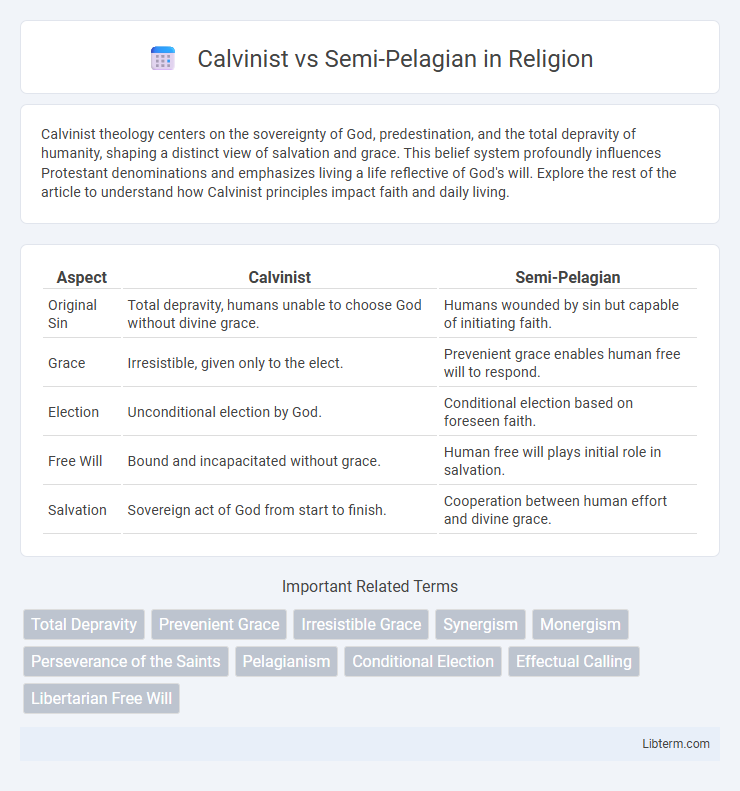Calvinist theology centers on the sovereignty of God, predestination, and the total depravity of humanity, shaping a distinct view of salvation and grace. This belief system profoundly influences Protestant denominations and emphasizes living a life reflective of God's will. Explore the rest of the article to understand how Calvinist principles impact faith and daily living.
Table of Comparison
| Aspect | Calvinist | Semi-Pelagian |
|---|---|---|
| Original Sin | Total depravity, humans unable to choose God without divine grace. | Humans wounded by sin but capable of initiating faith. |
| Grace | Irresistible, given only to the elect. | Prevenient grace enables human free will to respond. |
| Election | Unconditional election by God. | Conditional election based on foreseen faith. |
| Free Will | Bound and incapacitated without grace. | Human free will plays initial role in salvation. |
| Salvation | Sovereign act of God from start to finish. | Cooperation between human effort and divine grace. |
Introduction to Calvinism and Semi-Pelagianism
Calvinism, rooted in the teachings of John Calvin, emphasizes predestination and the absolute sovereignty of God in salvation, asserting that humans are entirely depraved and cannot initiate faith without divine intervention. Semi-Pelagianism, emerging as a mediating doctrine, challenges both Pelagianism and Augustinian predestination by advocating that the beginning of faith is an act of human free will, assisted but not caused by God's grace. These theological frameworks contrast on the extent of human agency versus divine grace in the salvation process, shaping Protestant and Catholic interpretations of soteriology.
Historical Background of the Doctrines
Calvinist doctrine originated in the 16th century during the Protestant Reformation, primarily shaped by John Calvin's teachings emphasizing predestination and total depravity. Semi-Pelagianism emerged earlier in the 5th century as a response to strict Augustinian predestination, advocating for an initial human free will in salvation before divine grace intervenes. The historical debate between these doctrines centers on the nature of grace and human cooperation in salvation, influencing Protestant and Catholic theological developments.
Core Beliefs of Calvinism
Calvinism centers on the doctrines of total depravity, unconditional election, limited atonement, irresistible grace, and perseverance of the saints, collectively known as the Five Points of Calvinism. It asserts that humans are inherently sinful and salvation is solely the result of God's sovereign choice, emphasizing predestination and God's grace as the decisive factor in salvation. In contrast, Semi-Pelagianism posits that human free will plays a cooperative role in initiating faith and salvation, rejecting total depravity and unconditional election.
Central Tenets of Semi-Pelagianism
Semi-Pelagianism emphasizes the role of human free will in the process of salvation, asserting that the initial act of faith is a human decision supported but not initiated by divine grace. It maintains that grace is necessary for salvation but is a cooperative effort between God's initiative and human response, contrasting with Calvinism's doctrine of irresistible grace and total depravity. Central tenets include prevenient grace enabling the will to choose salvation and the belief that faith begins as a human act, not solely by God's sovereign election.
Grace and Free Will: Key Differences
Calvinism asserts that divine grace is irresistible and predestines the elect, negating the role of human free will in salvation. Semi-Pelagianism emphasizes that initial faith is an act of human free will aided by prevenient grace, allowing cooperation with God's grace. The key difference lies in Calvinism's total depravity and unconditional election versus Semi-Pelagianism's synergistic approach to grace and human choice.
Predestination: Calvinist vs Semi-Pelagian Perspectives
Calvinist theology asserts unconditional predestination, emphasizing God's sovereign choice in electing individuals to salvation without regard to human merit or decision. Semi-Pelagianism rejects this strict predestination, advocating that initial faith is a human act, with God's grace subsequently assisting spiritual growth, thereby maintaining partial human contribution to salvation. The debate centers on divine sovereignty versus human free will in the salvation process, influencing doctrines on grace, election, and perseverance.
The Role of Human Effort in Salvation
Calvinism teaches that salvation is entirely the work of divine grace, with human effort playing no role in initiating or contributing to one's salvation, emphasizing predestination and total depravity. In contrast, Semi-Pelagianism maintains that while grace is necessary for salvation, human beings can make the first move toward God through their own effort, cooperating with divine grace for justification. This fundamental difference highlights Calvinism's assertion of irresistible grace versus Semi-Pelagian belief in synergistic cooperation between human will and God's grace.
Biblical Interpretations and Proof Texts
Calvinist theology interprets biblical texts such as Romans 9:16 and Ephesians 2:8-9 to emphasize God's sovereign election and irresistible grace in salvation. Semi-Pelagianism, citing passages like Philippians 2:12 and Deuteronomy 30:19, highlights human free will and the necessity of cooperating with divine grace. The Calvinist proof texts stress predestination and monergism, whereas Semi-Pelagian exegesis supports synergism and conditional election based on foreseen faith.
Influence on Modern Christian Thought
Calvinist theology, emphasizing predestination and total depravity, profoundly shapes Reformed and evangelical doctrines, highlighting God's sovereignty in salvation. Semi-Pelagianism, advocating for initial human cooperation in grace, influences many Wesleyan and Arminian traditions that stress free will and prevenient grace. The ongoing debate between these views continues to impact discussions on divine grace, human agency, and soteriology in contemporary Christian theology.
Summary: Calvinism and Semi-Pelagianism Compared
Calvinism emphasizes total depravity and irresistible grace, asserting that God's sovereign election ensures salvation without reliance on human free will. Semi-Pelagianism holds that the initial step toward faith is a human act, allowing partial human cooperation in the process of salvation while still acknowledging the necessity of divine grace. The primary theological divergence lies in the nature of human free will and grace's role in initiating and sustaining salvation.
Calvinist Infographic

 libterm.com
libterm.com